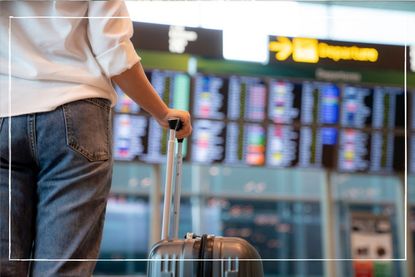Flight cancellations: how to get your money back
With TUI, EasyJet and BA continuing to cancel flights, you could be entitled to a new flight or compensation. We explain what you need to know if you’re caught up in the travel chaos


Holidaymakers are facing continued misery at UK airports, with hundreds facing flight cancellations as they prepare to jet off on holiday. If you’ve been caught up in airport chaos recently, understanding your rights is key to getting your money back.
A total of 377 flights have been cancelled from 25 to 31 May, with easyJet the most affected airline and Gatwick the worst-hit airport, according to flight data firm Cirium. TUI and British Airways have also cancelled dozens of flights. The disruption is expected to last until the end of the month with TUI planning to axe nearly 200 flights from Manchester Airport between now and 30 June.
Holidaymakers have expressed their fury over the last-minute flight cancellations and the lack of information regarding alternative flights and compensation. Airports and airlines have struggled to cope due to staff shortages and a surge in demand, leading to the travel chaos.
Rory Boland, editor of Which? Travel, calls the flight cancellations and long airport queues a “fiasco”. He says airlines have a duty to offer passengers the option of rebooking on any reasonable route as quickly as possible – even if that means using other carriers. But this does not always happen.
We explain what your rights are when it comes to flight cancellations and whether you are entitled to compensation.
Flight cancellations – what are you immediate options?
If your flight is cancelled, the airline must let you choose between two options. The first is a refund, the second is choosing an alternative route to get you to your destination. This is UK law, and applies to flights that are either:
GoodtoKnow Newsletter
Parenting advice, hot topics, best buys and family finance tips delivered straight to your inbox.
- departing from a UK airport on any airline
- arriving at a UK airport on an EU or UK airline
- or, arriving at an EU airport on a UK airline.
Ceri McMillan, travel insurance spokesperson for GoCompare says: “If your flight is delayed or cancelled, your airline has a duty to look after and compensate you under the rules set by the Civil Aviation Authority. If you’re flying from an airport in the EU or with an EU-based airline, then your airline has to help if your flight is cancelled or delayed past a certain amount of time – which means you won’t have to claim on your travel insurance. However, if you are traveling outside the EU, then your airline doesn’t have the same duty of care – so the compensation you will be entitled to will depend on your airline.”
Choosing an alternative route
If you still want to travel, the airline must look for another route. One that gets you to your destination as close to your arrival time as possible. This is known as “re-routing”. If the cancelling airline has another flight on the same day, it can rebook you on that.
However, if an alternative airline is flying there “significantly sooner” or other operators are available – such as Eurostar if your destination is somewhere like Paris or Rotterdam – then you have the right to be booked onto that alternative transport instead. This is according to the regulator the Civil Aviation Authority.
If the replacement route is to or from a different airport, the airline that cancelled your flight must provide or pay for extra transport.
This legal right applies to all passengers regardless of the reason for the cancellation. It also doesn’t matter how much notice you were given about the cancellation. It could have been several weeks in advance or as you were already at the airport waiting to check in.
Unfortunately, airlines can be reluctant to rebook a new route for affected passengers. If you are able to speak to your airline, firmly explain that re-routing is a legal requirement for cancelled flights.
Refund rights for flight cancellations
You are entitled to a full refund for a cancelled flight – unless you choose to be put on an alternative flight to your destination. You cannot claim both. If you are not put on an alternative flight, you can get your money back for any part of the ticket you haven’t used.
For example, you’re eligible for a refund for the full price of your ticket if you miss a connecting flight due to your first flight being cancelled. You can also claim a full refund for a return flight if the outbound leg is cancelled, which means you don’t fly and don’t use the return ticket either.
GoCompare’s Ceri McMillan says: “If your flight is cancelled and you haven’t opted for an alternative flight, then you can get a full refund for all or part of the journey. You may also be entitled to compensation for the cancellation itself, depending on the distance of your flight and how much notice you were given before the cancellation.
“One thing to be aware of is that you won’t be able to claim compensation for the cancellation itself if the circumstances were out of the airline’s control. Exclusions include bad weather, air sector strikes, political circumstances, natural disasters and even bird strikes (where a bird collides with the plane).”
How will I get the refund?
Any refund should be a cash refund. Some airlines will ask you for your bank account details to make the bank transfer. You should get the refund within seven days of the date of the flight – although many airlines miss this target. Airlines may offer vouchers or air miles instead. But you do not need to accept this if a cash refund is your preferred option.
If the airline is refusing to pay a refund, you do have options. If you paid for your flight with a credit card, an alternative is to contact the card provider to ask for the money, as it is jointly liable along with the airline under Section 75 of the Consumer Credit Act 1974. You can also try claiming from your debit card provider under the chargeback scheme.
Another option is to claim via your travel insurance. However, most insurers will insist you try and get the refund from the airline.
Can I claim for food and accommodation if my flight is cancelled?
Following a flight cancellation, the airline must provide you with assistance until you’re able to fly to your destination. For example, it should provide free accommodation if you have to stay overnight to depart on a new flight the next day. It should also provide free transport to the accommodation, as well as drinks and meals. The airline may give you vouchers for food and drink. You can also claim back the expense of any calls or emails.
If you are given a voucher and feel it is inadequate for your needs, you can try claiming for reasonable additional expenditure.
Guy Anker, content and operations director at our sister brand The Money Edit, says: “Not all airlines have been playing to the rules and paying for stranded passengers to be put onto flights with other airlines, or paying for extra accommodation, food or taxi costs. So make sure you know your rights and demand they play fair.
“If you’ve shelled out yourself for extra expenses, it’s essential you keep hold of receipts to claim the cost back from the airline. While the airline is unlikely to reimburse you for alcohol or a night in a spa hotel, they should cover any reasonable expenses.
“If they continue to refuse then check if you can claim on your travel insurance as some policies may cover you.”
What if I booked a package holiday?
If you booked a package holiday with a company that’s an Abta member and your flight is cancelled, you are entitled to a suitable alternative flight or, if that’s not possible, a full refund for the holiday. The refund should be paid to you within 14 days.
About 34,000 TUI customers have been told their June holidays out of Manchester airport have been axed. The travel giant said affected passengers were entitled to their money back within a guaranteed 14 days. Passengers may also have the opportunity to change their package booking to another holiday fee-free.
Can I claim for a cancelled flight on my travel insurance?
Your travel insurance may offer cover for flight delays or cancellations. This could include a lump sum based on the length of delay. Or it could be a refund for costs such as hotels, taxis and meals. However, many policies only cover delays due to adverse weather, strikes or aeroplane failure. So, they likely won’t pay out over the cancelled flights with TUI, BA and EasyJet.
Have a look at your policy to check if you can make a claim. If you have a packaged bank account, the bank or building society may provide travel insurance. Double-check the terms and conditions on that policy too.
According to the financial analyst Defaqto, the most common payout from insurers for an initial flight delay is £20. The maximum is £250.
Ceri McMillan from GoCompare says: “Some travel insurance policies may cover delays and cancellations, but this cover might depend on what your airline does, as well as the length of the delays and the policy that you have taken out. For instance, some policies may cover delays of up to 12 hours while others would only cover you if you have been delayed for 24 hours or more. Similarly, some insurers may cover for flight cancellations but may state that you can only claim if your cancelled flight was not rearranged within 24 hours. They may also require evidence from the airline that they are not providing a refund.
“GoCompare travel insurance always recommends checking the details of a policy before you buy to ensure that you know what you are covered for before you travel, as the cover can vary massively.”
Am I entitled to any flight cancellation or delay compensation?
If your flight is cancelled or delayed, you may be entitled to hundreds of pounds in compensation. It depends on what caused the cancellation, the length of the flight, and how much notice you were given. If the disruption wasn’t the airline’s fault and was caused by “extraordinary circumstances”, such as extreme weather or drone disruption, you won’t be eligible for redress.
However, the current chaos at UK airports is generally caused by staff shortages. In these circumstances, those airlines should pay compensation for cancelled flights.
How much compensation could I get?
If you received fewer than seven days’ notice of the cancellation, you can claim a payout based on the timings of the alternative flight. If the flight is under 1,500km (such as Glasgow to Amsterdam), you can claim £220 for delays of at least two hours.
For 1,500km – 3,500km journeys (such as Manchester to Marrakech), you must be delayed by at least three hours to receive £350 redress.
Passengers on long-haul flights of more than 3,500km (like Heathrow to Singapore) are entitled to compensation of £260 or £520 depending on the delay.
It’s important to note that delays are measured against the arrival time of your flight and not the departure time. Compensation for cancellations or delays with less than seven days notice is shown in the table below.
| Flight distance | Delay to arrival time | Compensations |
|---|---|---|
| Under 1,500km | At least 2 hours | £220 |
| 1,500 - 3,500km | At least 3 hours | £350 |
| More than 3,500km | At least 3 hours | Up to £520 (depending on delay) |
If you are told about the cancellation between seven and 14 days before you are due to fly, the compensation rules are slightly different. Payouts will range from £110 to £520.
The above applies as long as you were flying from a UK airport on any airline, arriving at a UK airport on an EU or UK airline, or arriving at an airport in the EU on a UK airline.
If you receive more than two weeks’ notice, you are not entitled to any compensation. However, you must still be given the option to rebook your journey or be paid a cash refund.
Video of the Week:

Ruth is passionate about helping people feel more confident about their finances. She was previously editor of Times Money Mentor, and prior to that was deputy Money editor at The Sunday Times.
A multi-award-winning journalist, Ruth started her career on a pensions magazine at the FT Group, and has also worked at Money Observer and Money Advice Service.
Outside of work, she is a mum to two young children, a magistrate and an NHS volunteer.
-
 Compromising may be killing your relationship - here are 5 ways to reach healthy compromises, according to relationship expert
Compromising may be killing your relationship - here are 5 ways to reach healthy compromises, according to relationship expertCompromising isn't always the best way to keep the peace in a relationship
By Charlie Elizabeth Culverhouse Published
-
 Best interactive pets for kids: 15 gift ideas for children of all ages
Best interactive pets for kids: 15 gift ideas for children of all agesFrom puppies to axolotls, take a look at our selection of the best interactive pets you can buy that are sure to be a hit with little animal lovers
By Sarah Handley Published
-
 'It isn’t a holiday – it is crucial bonding time' - 70% of dads can't afford to take two weeks paternity leave, according to new research
'It isn’t a holiday – it is crucial bonding time' - 70% of dads can't afford to take two weeks paternity leave, according to new researchThe research also found that only 14 per cent of fathers were ready to return to work mentally after taking their paternity leave
By Sarah Handley Published
-
 Two-child benefit cap 'pushes children into poverty' - campaigners urge government to scrap 'cruel policy' that impacts 1 in every 10 children
Two-child benefit cap 'pushes children into poverty' - campaigners urge government to scrap 'cruel policy' that impacts 1 in every 10 childrenThe controversial two-child benefit cap has met with strong opposition since its introduction in 2017
By Sarah Handley Published
-
 Gen-Z could be costing their parents £1,300 a year, by refusing to do this one thing (but it's not always their choice)
Gen-Z could be costing their parents £1,300 a year, by refusing to do this one thing (but it's not always their choice)It's not just parents who are facing the additional costs, the costs for Gen Z could be even higher
By Sarah Handley Published
-
 More than half of parents want to do this important thing for their kid's education but can’t afford to, according to new research
More than half of parents want to do this important thing for their kid's education but can’t afford to, according to new researchPressures on the family budget are preventing parents from paying for educational support outside of school
By Sarah Handley Published
-
 75% of mums feel guilty buying things if they earn less than their partners, according to social media poll, and the comments section was part heartbreaking, part inspiring
75% of mums feel guilty buying things if they earn less than their partners, according to social media poll, and the comments section was part heartbreaking, part inspiringSome mothers felt guilty for spending their partners money, while others saw it as household money instead
By Sarah Handley Published
-
 10 best zoos in the UK based on ticket prices, reviews and value for money
10 best zoos in the UK based on ticket prices, reviews and value for moneyThe best zoos in the UK have been determined based on a number of key factors, include prices, popularity, Trip Advisor ratings and how many animals they have
By Sarah Handley Published
-
 Child benefit is finally going to be made fairer - here's what's changing and when
Child benefit is finally going to be made fairer - here's what's changing and whenChild benefit is finally going to be made fairer - here's what's changing and when
By Sarah Handley Published
-
 Mum-of-three Helen Skelton shares 5 free and easy ways to keep kids entertained in the Easter holidays (and they all involve one thing)
Mum-of-three Helen Skelton shares 5 free and easy ways to keep kids entertained in the Easter holidays (and they all involve one thing)Presenter Helen Skelton has revealed how parents can keep costs low when keeping the kids occupied during school holidays
By Sarah Handley Published